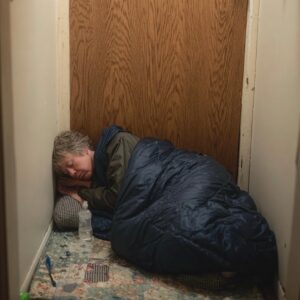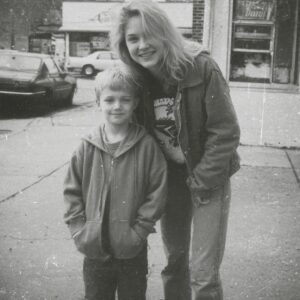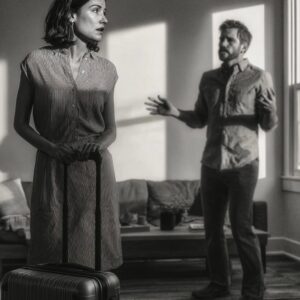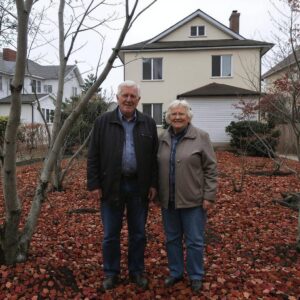
Every time I visited them, the same ritual played out. Sunday morning, soft jazz on the speaker, and exactly thirty-six white roses spread across the dining table. My Aunt Malin would unwrap them, and Grandma Sabine would trim each stem with these tiny gold-handled scissors she kept locked in a velvet pouch.
I thought it was just their bonding thing—floral therapy, maybe. Until I noticed something weird in one of their old photo albums: a newspaper clipping, yellowed and creased, tucked inside the back cover. No headline, just a photo of a demolished greenhouse and a handwritten date: April 11, 1987.
When I asked Aunt Malin about it, she smiled too quickly and said, “Oh, that’s from before you were born. A storm.”
But later that night, I checked the date.
April 11th was always the Sunday they never let anyone visit. Even birthdays got postponed if they fell on that weekend. Grandma would go silent for days afterward. No phone calls. No baking.
Last month, I decided to skip the usual silence and showed up anyway.
I told them I forgot it was that Sunday. Brought muffins to soften the blow.
Aunt Malin opened the door with puffy eyes and said, “Oh… you’re early.”
Inside, the vibe was different. No jazz. No fresh coffee. Just a heavy quiet that wrapped around the house like wet wool.
The roses were there, though. All thirty-six of them. But this time, they hadn’t been unwrapped. They just sat on the table like no one had the energy to touch them.
I offered to help, hoping to shake whatever sadness was dripping from the walls. “Want me to trim the stems today?”
Neither answered. Grandma just nodded toward the couch and went back into the kitchen, where she stirred something that wasn’t even on the stove.
Something was definitely off.
That night, when they both went to bed, I stayed behind under the excuse of reading. Really, I just waited until the house settled into sleep.
I found the velvet pouch easily. It was in its usual drawer, under the stack of linen napkins. The scissors were still gold, still perfect. But this time, there was something else.
A small envelope, sealed in wax. No name on the front. Just the same date: April 11, 1987.
I hesitated. My heart beat loud in my ears, the kind of beat that happens right before you find something you can’t un-know. Then I opened it.
There was a letter. And a photo. The photo first: three girls, no older than sixteen, standing in front of that same greenhouse. One of them was my grandma, younger but unmistakable. The second was Aunt Malin. The third… I didn’t recognize.
I read the letter next. It was short.
“To whoever finds this—Her name was Celine. She died because we were stupid. Because we lied. Thirty-six roses. One for each year she never got.”
I stared at the paper, expecting it to make more sense the longer I looked. But it didn’t.
I couldn’t sleep that night. My mind kept circling around that name. Celine. Thirty-six roses. Dead because of a lie.
The next morning, I confronted them. Or tried to.
I laid the photo and letter on the table, then sat across from them. I didn’t say anything. Just waited.
Grandma saw the letter first. Her hand trembled as she picked it up. Then she looked at Aunt Malin, who just stared at her lap.
For a long moment, nobody spoke.
Finally, Grandma whispered, “So it’s time.”
Aunt Malin nodded without looking up. “Yeah. It’s time.”
They told me everything.
Back in 1987, the three of them were best friends. Celine was new to town, the kind of girl who wore combat boots with sundresses and made everyone feel like life was more interesting when she was around. Grandma and Aunt Malin—back then, just teens named Sabine and Malin—followed her lead like moonlight on water.
The greenhouse had belonged to Celine’s mom. They’d sneak in after school, drink cheap soda, and paint each other’s nails while planning their futures. That place was their secret world.
Then one night, Celine told them about a boy.
He was older, twenty maybe. Worked at the gas station on Route 7. She said he liked poetry, that he called her “sunlight.” Sabine didn’t trust him. Malin did. That’s where things started to split.
Celine started spending more time with him. They didn’t see her as much. She’d come back with bruises she said were “nothing.” Then one day, she asked them to help her hide.
She said he had a temper. That she’d found out things about him. That she was scared.
They promised to help. But then Malin—scared and unsure—told the guy where Celine was hiding. She thought he just wanted to talk. She didn’t know he’d bring gasoline.
The greenhouse burned down that night.
Celine never made it out.
Sabine saw the flames from her bedroom window. She knew immediately.
The town called it a tragic accident. A faulty heater. No one looked deeper.
Malin confessed everything to Sabine two days later. They fought. Screamed. Didn’t talk for years.
But they both carried it.
On Celine’s birthday, every year, they sent white roses to the cemetery. Then they started arranging them together. Thirty-six of them, always. One for each year she missed.
I didn’t know what to say when they finished telling me.
I just sat there, hands cold, wondering how two women I loved so deeply could carry something like that in silence for decades.
I spent the next week looking up anything I could find on Celine. Obituaries. Old yearbooks. A mention of the fire in the local paper, just three lines long. No mention of her being inside.
I felt like I owed it to her.
Then, one afternoon, I got a phone call from a woman named Clara. She said she was Celine’s cousin. I had posted something on a local history group, asking about the greenhouse.
“I know who you are,” Clara said gently. “And I know what your grandma and aunt did.”
I froze. “How?”
“They sent roses to the wrong cemetery for years,” she said with a sad laugh. “But someone always noticed.”
Clara said she’d never told anyone. That the family kept Celine’s memory quiet after the fire. Too painful.
But then Clara told me something that made the hair rise on my arms.
“She didn’t die in that fire.”
I couldn’t believe it. I stammered. “But they said—she was—”
“She got out,” Clara said. “Badly burned. She ran. Disappeared for over a year. We thought she was dead until she called from a shelter in Texas.”
“Why didn’t she come back?”
“She said there was nothing left for her here. She changed her name. Lived quietly. She passed away two years ago. Lung cancer.”
My hands shook as I held the phone. “Did she ever… know? About them?”
Clara hesitated. “Yes. She knew. But she told me once, ‘Sabine was a true friend. Malin… made a mistake.’ That’s all she said.”
I cried after that call.
Not just for Celine. For my grandma. For my aunt. For the way life twisted in impossible ways.
I told them what Clara had said. That she lived. That she forgave them, in her own quiet way.
They both wept. Grandma held my hand and whispered, “We’ve been burying a ghost that wasn’t dead.”
We still arrange the roses on Sundays.
But now, we place them on the windowsill, not the table. Thirty-eight, now. One for each year of her life.
And one more—for peace.
Sometimes life gives us a second truth, hidden behind the first one. A twist that’s not meant to shock, but to heal.
We think we know the whole story. But sometimes, we’ve only heard the part our hearts could handle.
Celine didn’t want revenge. She wanted to disappear, to survive.
And she did.
And in the quiet corners of her memory, she left space for forgiveness.
That’s the twist, I think. Not just that she lived, but that she let go.
Some wounds don’t need justice. They need release.
If you’re reading this, maybe there’s someone in your past too. Someone whose story you’ve been telling from one side.
Reach out. Ask. Listen.
Because healing doesn’t always come with fireworks. Sometimes, it comes with roses. And the courage to say, “I didn’t know. But now I do.”
If this story moved you, share it with someone who needs to hear it. And don’t forget to like it—it helps more stories like this find their way to the people who need them most.





